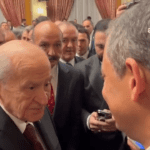The Turkish defence contractor Baykar, which is owned by the in-laws of President Recep Tayyip Erdoğan, and Israel Aerospace Industries were the co-sponsors of the 5th Anniversary International Defense Exhibition (ADEX) that took place in Azerbaijan from September 24-26 at the Baku Expo Center. The exhibition showcased military and security technology from 270 companies from 40 countries.
Baykar, which is run by Erdoğan’s son-in-law Selçuk Bayraktar and his elder brother Haluk Bayraktar, was one of the prominent firms that participated in the event. Other sponsors included Israel Aerospace Industries and Barzan Holdings, a Qatari defence contractor. The Ministry of Defense Industry of the Republic of Azerbaijan organized the event. The exhibition was attended by official delegations from twenty-seven different countries.
The participation of Turkish and Israeli defence firms in the 5th Anniversary International Defense Exhibition (ADEX) in Baku, Azerbaijan, despite the ongoing tensions and humanitarian crisis in Gaza, highlights the complexities in the geopolitical landscape. Although Turkey has been one of the most outspoken critics of Israel’s military operations in Gaza, publicly condemning the actions as “genocide” and “war crimes,” its defence companies continue to engage in international platforms alongside Israeli firms. This reflects a pragmatic stance where economic and strategic interests can diverge from official political rhetoric.
Baykar’s involvement, in particular, as a co-sponsor alongside Israel Aerospace Industries, suggests that defence industry collaborations and regional influence take precedence over strict adherence to political positions. Turkey’s duality in approach—strong public condemnation while maintaining defense and economic ties—shows the challenges countries face in balancing domestic and foreign policy objectives. Such events also emphasize the importance of exhibitions like ADEX in fostering military-industrial partnerships despite political sensitivities.
The Turkish government announced in May that it had terminated all commercial relations with Israel. However, recent reports reveal that Turkey is now concealing its exports to Israel by exaggerating the numbers of its exports to Palestine, which increased by 1,180 percent year-on-year in July.
The revelation of Turkey’s trade rerouting through Palestine instead of direct exports to Israel indicates an effort to address domestic criticism while continuing economic activities, pointing to the broader geopolitical strategies employed by Ankara.



